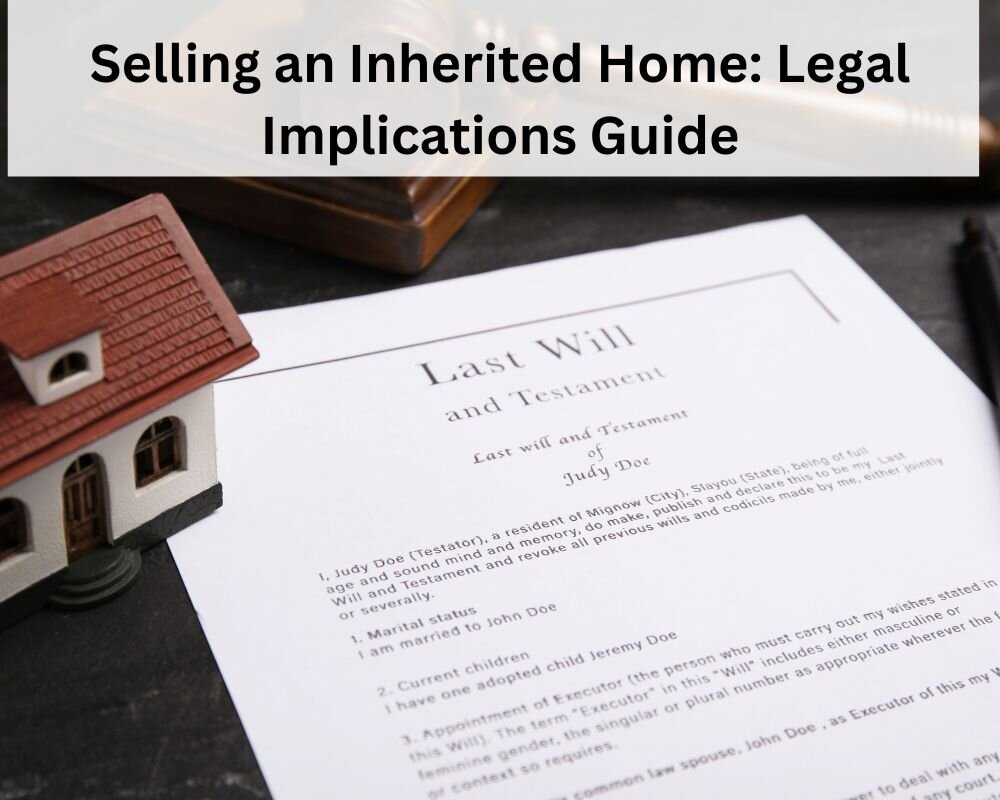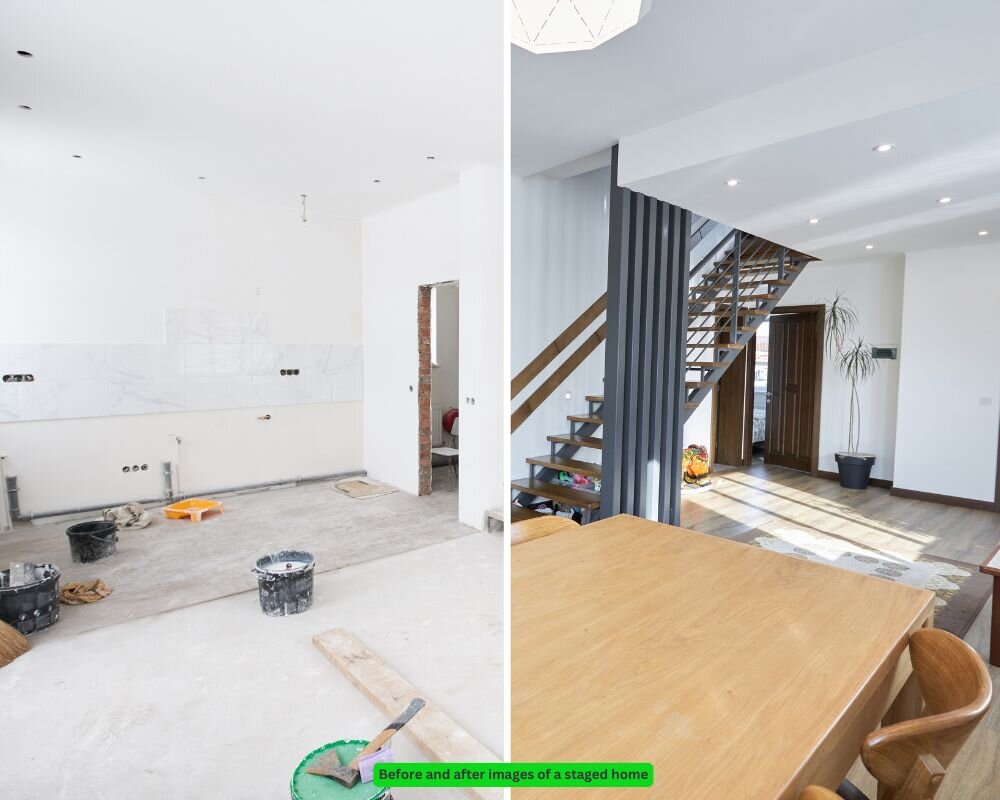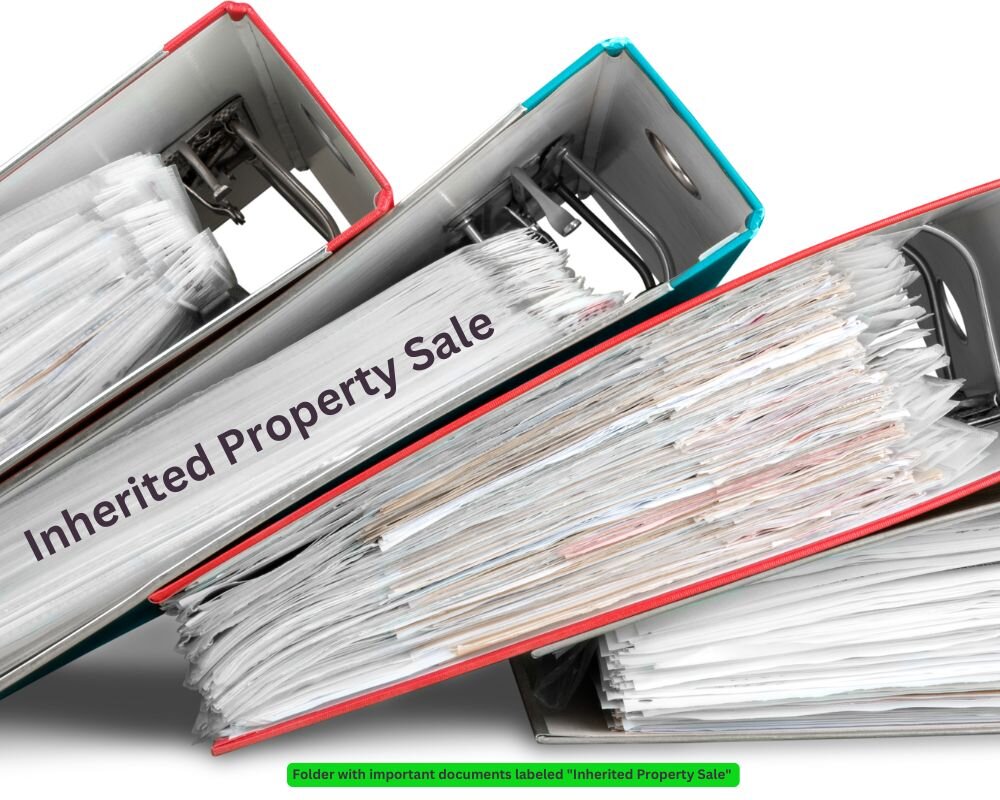
Inheriting a property can be a blessing and a challenge. This is especially true when dealing with real estate and the legal steps to sell an inherited home. It is important to understand estate laws, probate, and tax implications. This knowledge helps you make good decisions and get the most value from your inheritance. This guide will explain selling an inherited property’s legal and practical points. It will help you manage this emotional process with confidence.
Key Highlights
- Selling an inherited property differs from a typical home sale, often involving probate, tax implications, and potential complexities with multiple heirs.
- Understanding the legal process, including probate and estate tax implications, is crucial for a smooth transaction.
- Evaluating the home’s market value, potential capital gains taxes, and existing mortgages is essential for making informed decisions.
- Preparing the home for sale may involve repairs, staging, and deciding whether to sell as-is or renovate for a better sale price.
- Choosing the right real estate agent experienced in inherited properties, understanding legal documents, and managing family dynamics are key to a successful sale.
Understanding the Legal Process of Selling an Inherited Home

Selling an inherited home has its legal steps. This process is often more complicated than a regular real estate transaction. One main factor that affects the sale is whether the home is part of a will or is kept in a living trust.
If the property is in a living trust, it can skip the long probate process. On the other hand, homes handed out through a will often require going through probate court. It is important to understand the legal details about inherited property. This knowledge helps you figure out the timeline and what is needed for a successful sale.
The Role of Probate in Selling Inherited Property
Probate is a legal process that helps manage and share a deceased person’s assets, like real estate. This process pays off any debts and assigns the rest of the assets based on the will. If there is no will, the state laws will decide how to distribute them.
An executor is chosen by the court or listed in the will. This person handles the process. Their duties include finding the assets, paying off debts, and handing over ownership to the beneficiaries, which can affect the sale of the house. If you are selling inherited property, it is important to know the probate timeline. This can affect when you can list and sell the home.
The length of the probate process can change depending on the state and how complex the case is. Usually, it takes several months to finish. It is smart to work with a good probate attorney. They can help you understand the legal steps and make the transfer of ownership go smoothly.
Navigating the Probate Court’s Requirements
The probate court is very important in handling the distribution of assets and making sure the ownership is legally transferred when selling an inherited property. After the will is submitted to this court, the executor of the estate will appraise the assets, pay off debts, and ask the court for permission to sell the inherited home, which may involve avoiding capital gains.
It’s vital to understand and follow the exact rules and deadlines given by the probate court. This helps avoid any delays or problems during the selling process. You may need to provide some documents, like the death certificate, the will, and a list of assets.
The court usually wants the executor to show that the sale price is fair and good for the beneficiaries. Keeping in touch with the court and keeping good records is essential for meeting the legal requirements and making the sale smooth and timely.
Determining the Executor of the Estate
The executor of the estate is very important in the probate process. This person takes care of the deceased person’s assets and makes sure their wishes are followed as planned in the will. The executor’s tasks include finding the assets and paying off debts and taxes. This includes any inheritance tax. They also distribute the rest of the estate according to what the will says.
When selling an inherited home, the executor has a key role. They need to get the right court orders to make the sale happen. The executor talks with potential buyers and makes sure the sale is good for the beneficiaries.
It is very important to choose a trustworthy and skilled executor. This helps keep the process smooth and reduces conflict. Good communication between the executor and the beneficiaries during the probate process is needed. This helps keep everything clear and addresses any worries that come up.
Financial Considerations for Inherited Homes

Selling an inherited home comes with some important money matters to think about. It is essential to check the home’s current market value. You must also look into any tax implications that could arise.
Other things to consider include any mortgages, liens, or unpaid property taxes. These can affect how much profit you make from the sale.
Evaluating the Home’s Current Market Value
Before you list an inherited property, it’s important to get a good idea of its fair market value. This evaluation helps you set a fair asking price and avoid delays that can happen with overpricing.
Things like location, size, condition, and recent sales in the area play a big role in a home’s value. It’s a good idea to talk to a qualified real estate agent who knows your local market. They can offer a comparative market analysis (CMA) to give you valuable details about recent sales and pricing plans to get the best value for the property.
Keep in mind that if a home is priced too high, it could sit on the market for a long time. This could lead to price cuts and result in a lower final sale price. By having a well-researched and accurate valuation, you can make the selling process smoother and possibly more profitable when you sell your inherited house.
Capital Gains and Other Tax Implications
Selling an inherited home can have tax implications, mainly capital gains tax. When you inherit a property, it gets a “stepped-up” cost basis. This means the property’s value changes to its fair market value at the time the original owner passed away. This stepped-up basis can help reduce the capital gains tax you owe when you sell the home.
Capital gains tax is based on the profit you make from the sale, which can be influenced by the time of death and the tax basis. It is figured out as the difference between the final sale price and the stepped-up cost basis, which is crucial for those who inherit a house. There is also a home sale tax exclusion that could let you exclude some of the capital gains from your taxable income. This depends on factors like how long you have owned the home and whether you lived in it.
It is important to talk to a qualified tax expert to understand your specific tax situation. Tax laws can be complex and can differ from one person to another, especially when it comes to people who inherit property.
Dealing with Existing Mortgages and Liens
When you sell an inherited home, it is important to deal with any money issues linked to the property, including avoiding paying capital gains. If there is still an unpaid mortgage, you need to figure out what to do next. Some options are to use money from the estate to pay off the mortgage, talk to the lender about letting the buyer take over the mortgage, or include the mortgage payoff in the sale price.
Also, make sure to do a careful title search. This will help you find any liens. Liens are legal claims made against the property because of unpaid debts. They can make selling the home harder, and you need to settle them before you can complete the sale.
A good real estate attorney can help you manage these money issues. They can ensure that the closing process goes smoothly and without any surprising costs.
Preparing the Inherited Home for Sale

Preparing an inherited home for sale can take more steps than selling your own home. You will need to choose if you want to sell it as-is or spend money on repairs to increase the value of the property. This choice is important for getting more buyers and a better sale price.
Also, it is important to take care of personal belongings and clear out clutter. This helps show the home nicely and lets buyers picture themselves living there.
Deciding Whether to Sell As-Is or Renovate
One of the first choices when selling an inherited property is whether to sell it as-is or to make renovations. Selling as-is can save time and reduce costs, but it might lead to a lower sale price.
Renovations could increase the property’s value and bring in more buyers, which may raise the sale price. Still, renovations take time, money, and knowledge of which fixes will add the most value.
You should look closely at the property’s condition, the local market trends, and how much you can spend to find the best plan. It might be helpful to talk to a real estate agent. They can offer advice on what buyers expect and help you focus on upgrades that could raise the property’s value.
Clearing Personal Belongings and Decluttering
Clearing out personal belongings is an important and necessary step when getting an inherited property ready for sale, particularly if you live in the property. This job can be emotional and often takes time to decide what to keep, donate, or sell.
Removing clutter and personal items helps buyers think more about the house instead of its former owners. You can hold an estate sale for a quicker way to get rid of things. Donating items to charities can also give you tax benefits.
A tidy and neutral space gives buyers a chance to imagine their things and lifestyle in the home.
Staging the Home for Potential Buyers
Staging an inherited home is a smart way to make it more attractive when selling in real estate. Staging means setting up furniture and decorations to show off the home’s best parts. It also makes the home feel inviting for buyers.
Even though you may have to spend some money on staging services at first, it can lead to bigger profits when you list your home. Homes that are staged usually sell faster and for better prices. A nicely staged home helps buyers imagine living there, making them feel more connected and more likely to make a good offer.
To appeal to more buyers during open houses and showings, think about using decluttered spaces, neutral colors, and nice decor to enhance the value of the home. This helps create a warm and welcoming atmosphere that many people will like.
Choosing the Right Method to Sell an Inherited Home

Selling a home you inherited has different choices. Each choice has its good and bad sides, particularly when considering capital gains on inherited property. You can sell it with a regular real estate agent or go with a cash buyer.
It’s important to know the benefits and downsides of both ways. This will help you choose the best method for your goals when selling your inherited home.
Selling Through a Real Estate Agent vs. Selling to Cash Home Buyers
When you sell a property you inherited, you have an important choice to make. You can either sell it with a real estate agent or with a cash buyer to expedite the sale of the house.
Selling Through a Real Estate Agent:
- Pros: Selling a house can provide financial benefits, especially if you avoid paying unnecessary taxes. You might get a higher sale price. Your property can reach more people. You will get professional help during the process.
- Cons: It may take longer to sell, you will need to pay agent commissions, and you might have to make repairs and negotiate.
Selling to Cash Home Buyers:
- Pros: The sale can be quick. You do not need to make repairs. The closing process is easier.
- Cons: You may get a lower sale price. There is less room for negotiation. Be careful, as there can be scams.
The Benefits of Selling to a Cash Home Buying Company
Selling to a cash home-buying company has many benefits. It is a good choice for sellers who want to sell quickly and without stress, especially if they live in the home. Cash buyers make cash offers. This means there are no worries about getting loans or appraisals.
This simple method helps close the sale in weeks, not months like regular sales. Also, cash buyers usually buy homes as they are. This saves sellers the trouble and costs of fixing or updating the home.
Cash offers might be a little lower than market value, but they can help you avoid paying lengthy closing costs. However, the fast sale and no repair costs can make up for that. This is especially true for homes that are inherited and need a lot of work or if there are tight timelines.
How to Vet Potential Cash Home Buyers
When selling to cash home buyers, there are many benefits. However, it is very important to check potential buyers carefully. This helps you avoid scams and ensures the transaction is real. Look for reliable companies that have a good history, positive reviews, and clear business practices to help you sell your inherited house.
Try to get recommendations from trusted people. This can be financial advisors, real estate lawyers, or friends who know good cash buyers. Keep communication clear and open with potential buyers. Ask questions about their offer, timeline, and experience, particularly about capital gains on inherited property.
A trustworthy cash-buying company will be happy to answer your questions. Don’t be afraid to ask for proof of funds. It’s also a good idea to have a lawyer check any contracts or agreements before you agree to a sale.
Legal Documents and Paperwork Required

Selling an inherited property requires careful handling of legal documents and paperwork. These papers prove ownership, help transfer the title, and make sure everything follows the law.
Collecting and sorting these important documents early on will make the process easier. It will also reduce the chances of delays or disagreements during the sale of the house.
Essential Documents for Selling an Inherited Property
Several legal documents are essential for a successful real estate transaction when selling an inherited property. These documents provide proof of ownership and authorization to sell the property on behalf of the estate.
As a personal representative tasked with handling the estate, you’ll need to gather and organize these documents to ensure a smooth closing process:
| Document | Description |
| Death Certificate | Verifies the death of the property owner. |
| Will | The legal document outlining the deceased person’s wishes for asset distribution, including naming beneficiaries for the property. |
| Probate Court Documents | Any court orders, letters of testamentary, or other relevant documents issued by the probate court authorizing the personal representative to sell the property. |
| Property Deed | The legal document proving ownership of the property. |
Transfer of Deed and Title Search Considerations
The transfer of a deed is an important part of selling inherited property. It shows the legal change of ownership from the estate to the new owner. The process starts with a title search. This search looks at public records to verify who owns the property and to find any issues, like liens or easements.
After confirming that the title is clear, a deed is created. This deed has a legal description of the property and includes details about the seller (the estate) and the buyer. At the closing of the sale, the personal representative of the estate signs the deed. It is then notarized and recorded at the county recorder’s office.
Recording the deed officially marks the change of ownership and updates the title history of the property. This ensures that the transfer is legally valid and clear.
Disclosures and Compliance with State Laws
State laws require sellers to tell potential buyers important information. This helps buyers make informed choices about the property’s condition and history. Sellers must usually share details about known problems, environmental issues, or anything that could lower the property’s value.
If sellers do not share this information, they may face legal problems, which could lead to lawsuits or financial losses. It is also important to understand the specific state rules for selling inherited properties.
These laws usually include special rules for probate, deadlines for selling, and what must be disclosed. It is a good idea to speak with a real estate attorney who knows your state’s laws. This can help make sure you follow all the rules and have a legal transaction.
Selling an Inherited House to Click Cash Home Buyers
Cash home buyers are often real estate investors or companies. They give you a different way to sell an inherited house. These buyers buy homes in any condition and usually finish the sale much faster than regular buyers.
Cash home buyers have some good benefits. A quick sale is one, and you can sell the house “as-is.” But it’s important to know that their offers are mostly lower than the market value. They consider their profit and possible repair costs. So, while this may look appealing for those who want a fast and simple process, you should carefully check the offer against the property’s fair market value to make a smart choice.
The Bottom Line
Selling an inherited home can be tricky because of the legal and financial things to consider. It’s important to understand probate and the tax implications involved. You should also prepare the property well to increase the value of the home. Choose the best selling method for you, whether it’s a real estate agent or a cash home buyer, especially if you decide to sell quickly. Make sure to have all the legal documents ready. Clear communication and setting realistic expectations are vital for a smooth sale, especially for people who inherit property. Remember, this process can be emotionally hard, so don’t hesitate to ask for help if you need it. By following these steps, you can make selling easier and help everyone involved have a good outcome.
Frequently Asked Questions

How Long Does the Probate Process Take Before You Can Sell?
The probate process is managed by the executor. It can take anywhere from a few months to a year. You usually have to wait this long before you can sell an inherited property. This legal process helps settle any debts and identifies the rightful beneficiaries.
Can You Sell an Inherited Home If There Are Multiple Heirs?
Yes, all heirs have to agree to the sale. This usually needs good communication and teamwork between family members or beneficiaries. An executor may help manage the selling process to make sure it goes fairly.
What Are the Tax Implications of Selling an Inherited Home?
Tax rules change depending on things like where you live, how much profit you make, and the tax laws that apply to you. You might have to pay capital gains tax, inheritance tax in certain states, and property taxes. It’s smart to talk to a tax advisor for advice that fits your situation after you sell the house.
How Do Cash Home Buyers Simplify the Process of Selling an Inherited Home?
Cash home buyers make it easier to sell inherited property. They offer a fast sale, usually without needing repairs, appraisals, or the usual financing. This simple real estate transaction lowers stress and speeds things up for sellers.
What Should You Do If the Inherited Home Has a Mortgage?
If you inherit a home that has a mortgage, talk to the lender about your options, especially if you decide to sell. You can think about using the inheritance to pay off the mortgage, moving the mortgage to your name, or selling the home to pay off the loan while selling. It is very important to contact the lender as your next step.
Negotiating Offers and Closing the Sale
When you negotiate offers and close a sale, it’s important to look closely at the offers with your real estate agent. You should think about things like contingencies, timelines, and the property’s fair market value. Once you agree on the right terms, the closing process will complete the sale.
Understanding and Evaluating Buyer Offers
Carefully look at buyer offers during the sale process with your real estate agent. Check the offered sale price, any conditions like financing or inspections, and your timeline for selling. This careful evaluation helps you make a good decision.
Finalizing the Sale: Steps and Expectations
Finalizing the sale involves important steps. These include signing the closing papers, transferring the property title, and getting the money from the sale. The executor makes sure that all legal rules are followed. They also update the beneficiaries during the closing process.
Distributing the Sale Proceeds Among Heirs
An executor takes care of the money from selling the inherited home. They follow the rules in the will or estate plan. This makes sure the funds go to the right people fairly and legally.
Post-Sale Considerations and Responsibilities
Post-sale duties involve a few important tasks. You may need to handle any capital gains tax. If necessary, you should also manage estate tax. Additionally, there might be a need to distribute proceeds from inheritance tax, which can impact the sale of inherited property. It is often helpful to get advice from a financial advisor during this process.
Managing Capital Gains and Other Taxes After the Sale
After the sale, you must figure out how much tax you owe on capital gains. You might reduce any taxable gain by using deductions or exemptions. It’s best to talk to a tax professional about how to avoid capital gains when selling your inherited property. They can help you calculate and file your income tax return correctly.
Closing Out the Estate: A Checklist for Sellers’
Closing an estate includes tasks that the executor must handle. They need to file the final tax returns. They also have to pay any debts that are still due. After that, they should share the leftover assets according to the estate plan. Finally, the executor must get a discharge from the probate court to finish everything up.
Reinvesting or Allocating Proceeds from the Sale
After you receive the money, talk to a financial advisor. They can help you look at options for reinvesting, using the funds for other assets, or following the estate plan. Think carefully about your investment options.
Strategies for a Smooth Sale Process
A smooth sale process includes hiring a good real estate agent. You also need to price the property fairly. It’s important to get the property ready for showings. Understanding the timelines is necessary as well. Finally, keep open communication with everyone involved.
Effective Communication with All Parties Involved
Effective communication is very important during the real estate transaction. It is often led by the executor. It’s vital to keep family members informed about how the sale is going. Also, make sure to quickly answer any concerns or questions that family members may have regarding the sale of inherited property.
Setting Realistic Timelines and Expectations
Understand that selling an inherited property can take time, especially when it is in probate, and you may owe capital gains. It is important to set realistic timelines and expectations. This can help reduce frustration and make it easier to handle the emotional parts of the process.
Choosing the Right Professionals to Assist with the Sale
- Gather a team of experts who know about estate sales.
- This should include a good real estate agent, a financial advisor, and a probate attorney.
- You might also want an appraiser for the estate sale.
- This team can help you work through legal, financial, and tax issues easily.
Handling Emotional Aspects of Selling a Family Home
- Recognize the feelings that come with selling a family home.
- Give yourself and other family members time to deal with these emotions and say farewell.
- Talk about your feelings openly.
- Get support from family or consider grief counseling if necessary.

Contact Us
We would love to hear from you! Please fill out this form and we will get in touch with you shortly.


